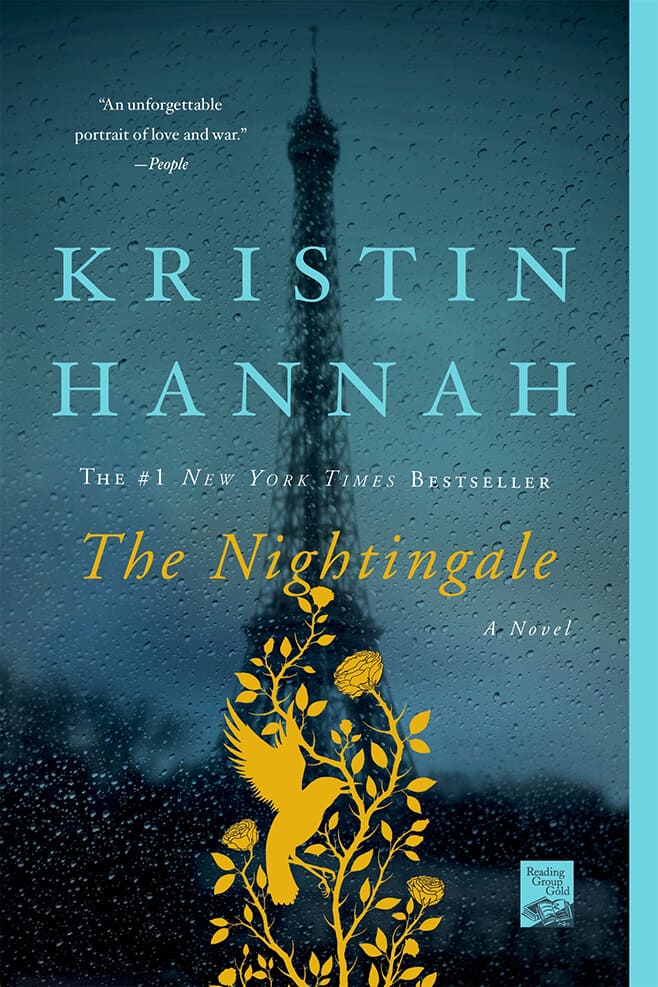Published by St. Martins
Press, 2015, available from Indigo in hardcover ($28.92), paperback ($15.39) or
audiobook ($40.07) here.
Or from Amazon.ca, including a Kinndle edition ($8.99) here.
Kristin Hannah not only engages the reader,
but makes us care deeply about innocent people living through war. Hannah was
inspired after reading Little Cyclone by Airey Neave (available from Indigo here), the true story of Andree du Jongh, a Belgian woman, who developed
the escape routes out of Nazi-occupied France through the Pyrenees.
Hannah’s
powerful and compelling story follows the lives of two sisters throughout
occupied France during WWII. Through these women, the reader experiences the
courage required for everyday life in wartime. Hannah is a master of creating
and developing character. The reader cannot help be drawn in.
Their
father, Julien Rossignol, a Parisian poet and bookseller, abandoned his
daughters to a housekeeper at Le Jardin,
their summer home, and two weeks after their mother’s death “Papa gave up being
a father” (p. 7).
The girls are “so far apart in age {ten years} it was as if they were from different
families” (p.8). Vianne is the eldest and a beauty with her porcelain skin and
strawberry blonde hair. She finds love and a protector at an early age with Antione. Dark, willful and impatient Isabelle never feels loved and is cloying in her neediness. “This essential difference has always been
between them. Vianne the rule follower and Isabelle the rebel.” (p.15)
I
admire Vianne’s quiet courage, her ability to carry on and fly under the radar
and not draw attention to herself as she raises a young daughter alone, her
husband is a German prison camp.
Isabelle’s
anger causes to her act rashly, to deface a German propaganda poster and be
noticed, luckily for her, not by Gestapo, but by resistance fighters. These men
invite her to join their group. Perhaps Isabelle takes chances because she
feels unloved, unworthy. Even in the novel’s passionate moments with Gaetan,
she can’t express her feelings. Yet her torture described in graphic detail and
her harrowing suffering in Ravenstock, a Nazi prison, gains her our sympathy
and compassion. The title comes from her code name and I wonder if the author
thought of the symbolism; i.e. as the male nightingale sings and the female is
associated with sacrifice and loss.
 |
| Kristin Hannah |
Secondary
characters provide a German perspective. Captain Beck of The Wehrmacht is
billeted with Vianne. He is
not the stereotypical German (vicious and arrogant) but reminiscent of the
soldier in Irene Nemirovsky’s Suite
Francaise.
Handsome, blond Beck is a gentleman and family man who shows Vianne small kindnesses by locating her husband’s
prisoner of war camp and facilitating delivery of letters and care packages, and
sharing a fish he has caught.
We are never completely sure if he is motivated
by decency or his attraction to Vianne but her loyalty to her husband prevails and
Beck does not force himself on her as he could.
Early
on we see Beck is a romantic, enjoying the starlight in the orchard. Vianne
senses sadness about him and feels a connection; they were
alike in a way, both of them far away from the people they love. Later when he
offers her a glass of wine; the air is erotic. “His touch felt hot against her
cold hands…..the scent of black cherries and dark rich earth….his voice as
sweet and rich as the wine.” (p. 232) I found myself hoping for a tryst. Yet
when he must act as a soldier he does.
As
the war heats up the novel turns dark. We fear for Vianne when cruel and
vindictive Von Richter questions her after Beck’s disappearance, frisking her
for weapons “sliding his spidery fingers across her breast.” (p.394) This act
foreshadows the brutality to come. Vianne not only survives but
prevails and out of love risks her life to save her neighbour’s Jewish
children.
Hannah’
seamless writing weaves in exacting historical detail, capturing the mood of
the time. Each sister grows in depth and strength as this engrossing story is
played out and are re-united in the closing chapters. This is a novel
to read and re-read. Not surprisingly it will soon be a major motion picture.
***
Note: Quick Brown Fox
welcomes your book reviews – or any kind of review of anything, anywhere or
anybody. If you want to review your favourite coffee shops or libraries,
babysitters or lovers (no real names please), go for it. See examples of book
reviews here (and scroll down); other
reviews here (and scroll down).
QBF also
welcomes essays about a favourite book or about your experience of reading
or writing – and other essays, too. Read a few essays on the blog to get a
taste of what other writers have done (see here and scroll down).
Submit
to: brianhenry@sympatico.ca
Include a short bio at the end of your piece and attach a photo of
yourself if you have one that’s okay.
Gail M. Murray seeks to capture the essence of the moment; her writing is a response to
her natural and emotional environment. Her poems have been published in Blank Spaces, Wordscape, Arborealis and on
CommuterLit. Her creative nonfiction has appeared in The Globe and
Mail, Trellis, Heartbeats, Renaissance, NOW
Magazine, Blank Spaces, Our Canada and More of Our Canada.
See Brian’s complete current schedule here, including Saturday workshops, weekly writing classes, and weekend retreats in Algonquin Park, Alliston, Bolton, Barrie, Brampton,
Burlington, Caledon, Collingwood, Georgetown, Georgina, Guelph, Hamilton,
Jackson’s Point, Kitchener-Waterloo, London, Midland, Mississauga, New
Tecumseth, Oakville, Ottawa, Peterborough, St. Catharines, Sudbury, Toronto,
Windsor, Woodstock, Halton, Muskoka, Peel, Simcoe, York Region, the GTA,
Ontario and beyond.



No comments:
Post a Comment
Note: Only a member of this blog may post a comment.